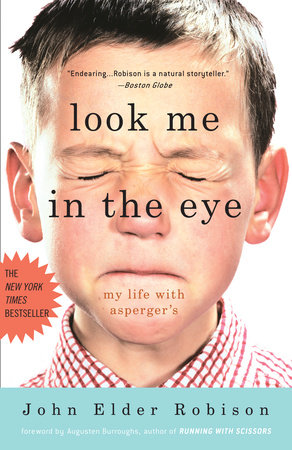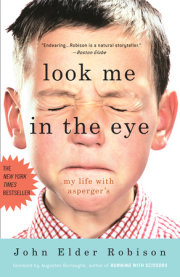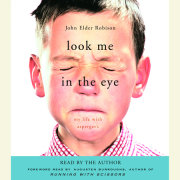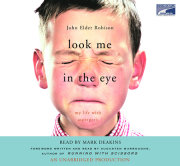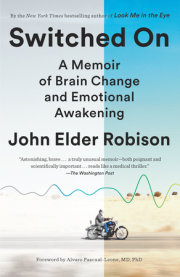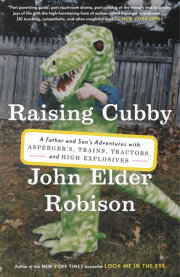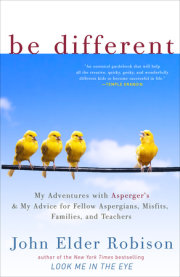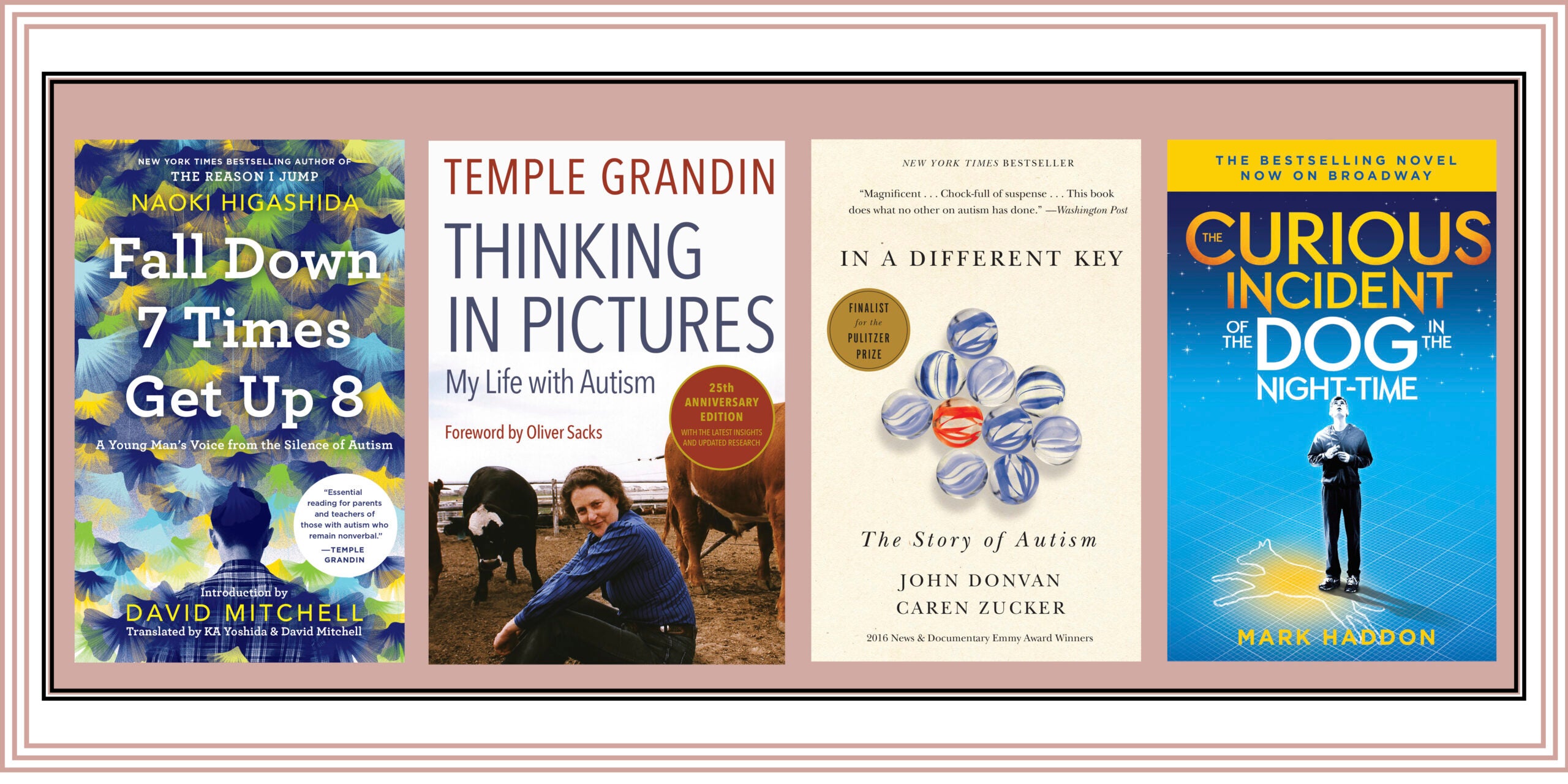1A Little MisfitIt was inconceivable to me that there could be more than one way to play in the dirt, but there it was. Doug couldn't get it right. And that's why I whacked him. Bang! On both ears, just like I saw on The Three Stooges. Being three years old was no excuse for disorderly play habits.
For example, I would use my mother's kitchen spoon to scoop out a ditch. Then, I would carefully lay out a line of blue blocks. I never mixed my food, and I never mixed my blocks. Blue blocks went with blue blocks, and red blocks with red ones. But Doug would lean over and put a red block on top of the blue ones.
Couldn't he see how wrong that was?
After I had whacked him, I sat back down and played. Correctly.
Sometimes, when I got frustrated with Doug, my mother would walk over and yell at me. I don't think she ever saw the terrible things he did. She just saw me whack him. I could usually ignore her, but if my father was there, too, he would get really mad and shake me, and then I would cry.
Most of the time, I liked Doug. He was my first friend. But some of the things he did were just too much for me to handle. I would park my truck by a log, and he would kick dirt on it. Our moms would give us blocks, and he would heap his in a sloppy pile and then giggle about it. It drove me wild.
Our playdates came to an abrupt end the following spring. Doug's father graduated from medical school and they moved far, far away to an Indian reservation in Billings, Montana. I didn't really understand that he could leave despite my wishes to the contrary. Even if he didn't know how to play correctly, he was my only regular playmate. I was sad.
I asked my mother about him each time we went to the park, where I now played alone. "I'm sure he'll send you a postcard," my mother said, but she had a funny look on her face, and I didn't know what to make of it. It was troubling.
I did hear the mothers whispering, but I never knew what they meant.
". . . drowned in an irrigation ditch . . ."
". . . the water was only six inches deep . . ."
". . . must have fallen on his face . . ."
". . . his mother couldn't see him, so she went outside and found him there . . ."
What is an irrigation ditch? I wondered. All I could figure out was, they weren't talking about me. I had no idea Doug was dead until years later.
Looking back, maybe my friendship with Doug wasn't the best omen. But at least I stopped whacking other kids. Somehow I figured out that whacking does not foster lasting friendship.
That fall, my mother enrolled me at Philadelphia's Mulberry Tree Nursery School. It was a small building with kids' drawings on the walls and a dusty playground enclosed with a chain-link fence. It was the first place where I was thrown together with children I didn't know. It didn't go well.
At first, I was excited. As soon as I saw the other kids, I wanted to meet them. I wanted them to like me. But they didn't. I could not figure out why. What was wrong with me? I particularly wanted to make friends with a little girl named Chuckie. She seemed to like trucks and trains, just like me. I knew we must have a lot in common.
At recess, I walked over to Chuckie and patted her on the head. My mother had shown me how to pet my poodle on the head to make friends with him. And my mother petted me sometimes, too, especially when I couldn't sleep. So as far as I could tell, petting worked. All the dogs my mother told me to pet had wagged their tails. They liked it. I figured Chuckie would like it, too.
Smack! She hit me!
Startled, I ran away. That didn't work, I said to myself. Maybe I have to pet her a little longer to make friends. I can pet her with a stick so she can't smack me. But the teacher intervened.
"John, leave Chuckie alone. We don't hit people with sticks."
"I wasn't hitting her. I was trying to pet her."
"People aren't dogs. You don't pet them. And you don't use sticks."
Chuckie eyed me warily. She stayed away for the rest of the day. But I didn't give up. Maybe she likes me and doesn't know it, I thought. My mother often told me I would like things I thought I wouldn't, and sometimes she was right.
The next day, I saw Chuckie playing in the big sandbox with a wooden truck. I knew a lot about trucks. And I knew she wasn't playing with her truck correctly. I would show her the right way. She will admire me and we will be friends, I thought. I walked over to her and took the truck away and sat down.
"Miss Laird! John took my truck!"
That was fast!
"I did not! I was showing her how to play with it! She was doing it wrong!" But Miss Laird believed Chuckie, not me. She led me away and gave me a truck of my own. Chuckie didn't follow. But tomorrow was another day. Tomorrow, I would succeed in making friends.
When tomorrow came, I had a new plan. I would talk to Chuckie. I would tell her about dinosaurs. I knew a lot about dinosaurs, because my father took me to the museum and showed me. Sometimes I had scary dreams about them, but overall, dinosaurs were the most interesting thing I knew of.
I walked over to Chuckie and sat down.
"I like dinosaurs. My favorite is the brontosaurus. He's really big."
Chuckie did not respond.
"He's really big but he just eats plants. He eats grass and trees.
"He has a long neck and a long tail."
Silence.
"He's as big as a bus.
"But an allosaurus can eat him."
Chuckie still didn't say anything. She looked intently at the ground, where she was drawing in the sand.
"I went to see the dinosaurs at the museum with my dad.
"There were little dinosaurs, too.
"I really like dinosaurs. They're neat!"
Chuckie got up and went inside. She had completely ignored me!
I looked down at the ground where she had been staring. What was she looking at that was so interesting? There was nothing there.
All my attempts to make friends had failed. I was a failure. I began to cry. Alone in the corner of the playground, I sobbed and smashed the toy truck into the ground again and again and again, until my hands hurt too much to do it anymore.
At the end of recess, I was still there, sitting by myself. Staring into the dirt. Too humiliated to face the other kids. Why don't they like me? What's wrong with me? That was where Miss Laird found me.
"It's time to go back inside." She grabbed my little paw and towed me in. I wanted to roll up in a ball and disappear.
Recently, one of my friends read the passage above and said, "Shit, John, you're still that way now." He's right. I am. The only real difference is that I have learned what people expect in common social situations. So I can act more normal and there's less chance I'll offend anyone. But the difference is still there, and it always will be.
People with Asperger's or autism often lack the feelings of empathy that naturally guide most people in their interactions with others. That's why it never occurred to me that Chuckie might not respond to petting in the same way a dog would. The difference between a small person and a medium-sized dog was not really clear to me. And it never occurred to me that there might be more than one way to play with a toy truck, so I could not understand why she objected to my showing her.
The worst of it was, my teachers and most other people saw my behavior as bad when I was actually trying to be kind. My good intentions made the rejection by Chuckie all the more painful. I'd watched my parents talk to other grown-ups and I figured I could talk to Chuckie. But I had overlooked one key thing: Successful conversations require a give and take between both people. Being Aspergian, I missed that. Totally.
I never interacted with Chuckie again.
I stopped trying with any of the kids. The more I was rejected, the more I hurt inside and the more I retreated.
I had better luck dealing with grown-ups. My disjointed replies didn't bring the conversation to an abrupt halt. And I tended to listen to them more than I listened to kids, because I assumed they knew more. Grown-ups did grown-up things. They didn't play with toys, so I didn't have to show them how to play. If I tried to pet a grown-up with a stick, he'd take it away. He wouldn't humiliate me by yelling and running to the teacher. Grown-ups explained things to me, so I learned from them. Kids weren't so good at that.
Most of the time, I played by myself, with my toys. I liked the more complex toys, especially blocks and Lincoln Logs. I still remember the taste of Lincoln Logs. When I wasn't chewing them, I made forts and houses and fences. When I got a little bigger, I got an Erector Set. I was very proud of that. I built my first machines with the Erector Set.
Machines were never mean to me. They challenged me when I tried to figure them out. They never tricked me, and they never hurt my feelings. I was in charge of the machines. I liked that. I felt safe around them. I also felt safe around animals, most of the time. I petted other people's dogs when we went to the park. When I got my poodle, I made friends with him, too.
"Look what your grandpa Jack sent you, John Elder!" (My parents named me John Elder Robison to honor my great-grandpa John Glenn Elder, who died before I was born.) My dad had brought home a wooly, ill-tempered, and probably genetically defective dog, most likely a reject from some dog pound. But I didn't know that. I was fascinated. He growled at me and wet the floor when my father put him down.
Copyright © 2007 by John Elder Robison. All rights reserved. No part of this excerpt may be reproduced or reprinted without permission in writing from the publisher.

